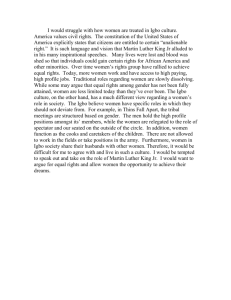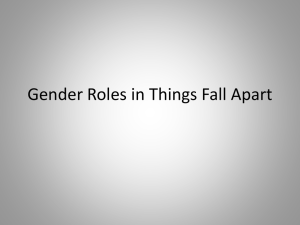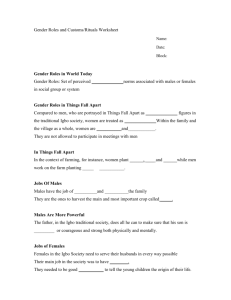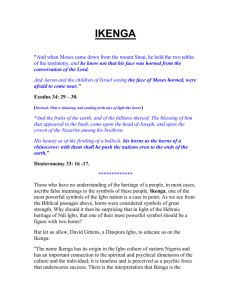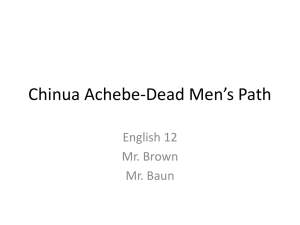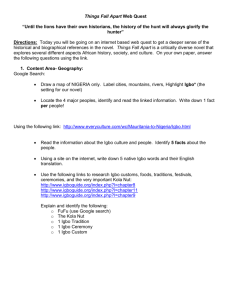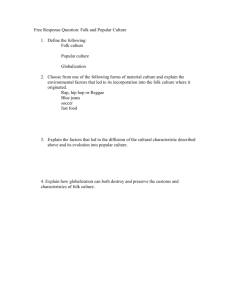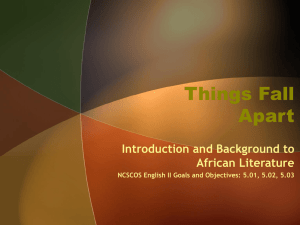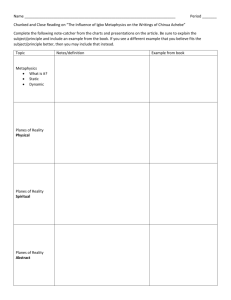The Role of Folk Music in Traditional African Society
advertisement
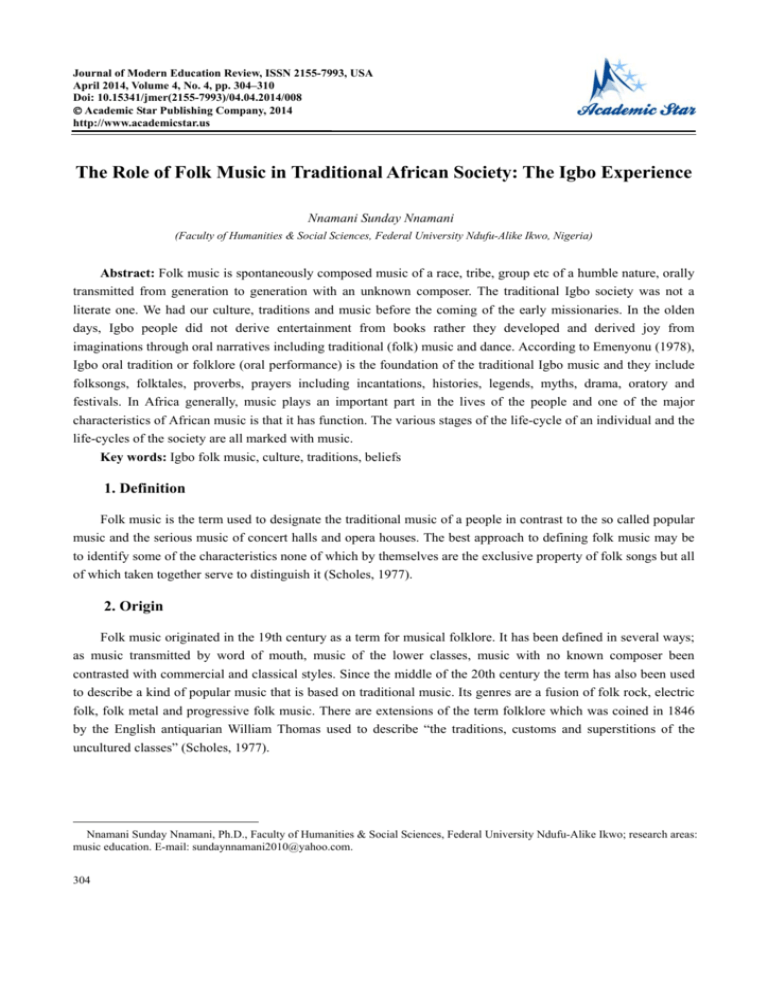
Journal of Modern Education Review, ISSN 2155-7993, USA April 2014, Volume 4, No. 4, pp. 304–310 Doi: 10.15341/jmer(2155-7993)/04.04.2014/008 Academic Star Publishing Company, 2014 http://www.academicstar.us The Role of Folk Music in Traditional African Society: The Igbo Experience Nnamani Sunday Nnamani (Faculty of Humanities & Social Sciences, Federal University Ndufu-Alike Ikwo, Nigeria) Abstract: Folk music is spontaneously composed music of a race, tribe, group etc of a humble nature, orally transmitted from generation to generation with an unknown composer. The traditional Igbo society was not a literate one. We had our culture, traditions and music before the coming of the early missionaries. In the olden days, Igbo people did not derive entertainment from books rather they developed and derived joy from imaginations through oral narratives including traditional (folk) music and dance. According to Emenyonu (1978), Igbo oral tradition or folklore (oral performance) is the foundation of the traditional Igbo music and they include folksongs, folktales, proverbs, prayers including incantations, histories, legends, myths, drama, oratory and festivals. In Africa generally, music plays an important part in the lives of the people and one of the major characteristics of African music is that it has function. The various stages of the life-cycle of an individual and the life-cycles of the society are all marked with music. Key words: Igbo folk music, culture, traditions, beliefs 1. Definition Folk music is the term used to designate the traditional music of a people in contrast to the so called popular music and the serious music of concert halls and opera houses. The best approach to defining folk music may be to identify some of the characteristics none of which by themselves are the exclusive property of folk songs but all of which taken together serve to distinguish it (Scholes, 1977). 2. Origin Folk music originated in the 19th century as a term for musical folklore. It has been defined in several ways; as music transmitted by word of mouth, music of the lower classes, music with no known composer been contrasted with commercial and classical styles. Since the middle of the 20th century the term has also been used to describe a kind of popular music that is based on traditional music. Its genres are a fusion of folk rock, electric folk, folk metal and progressive folk music. There are extensions of the term folklore which was coined in 1846 by the English antiquarian William Thomas used to describe “the traditions, customs and superstitions of the uncultured classes” (Scholes, 1977). Nnamani Sunday Nnamani, Ph.D., Faculty of Humanities & Social Sciences, Federal University Ndufu-Alike Ikwo; research areas: music education. E-mail: sundaynnamani2010@yahoo.com. 304 The Role of Folk Music in Traditional African Society: The Igbo Experience 3. Characteristics Folk music normally exists in oral tradition being taught and learned by word of mouth without the use of written music. Occasionally the written or printed tradition influences folk music as when art songs or popular songs are taken up by genuine folksingers. It is the music of the rural groups, of rural origin used by recent migrations to the city. Folk songs are associated with activities such as work, games, dances, wars or religious ceremonies. There are still others which are purely for entertainment, enjoyment by the performer or listener. It is usually the music of the relatively uneducated and unsophisticated strata of the society normally produced and disseminated by formal institutions such as schools or churches. Finally it is usually a relatively simple music when compared with concerts because it is intended to be sung by many perhaps even most ordinary individuals in a community. However, it is important to note that folk music although earlier on distinguished by its sound from the popular and concert music, always bears a close relationship historically and stylistically to the other kinds of music in the same culture. According to Scholes (1977) at http://en.wikipedia.org (2010): Folk music may tend to have certain characteristics but it cannot clearly be differentiated in purely musical terms. One meaning often given is that of “old songs, with no known composers”, another is that of music that has been submitted to an evolutionary. He went further to explain that such depends upon the cultural processes rather than abstract musical types upon continuity and oral transmission. Correlating the above, Charles Seeger (1980) was quoted as having said that: Folk music is associated with a lower class in societies which are culturally and socially stratified that is which have developed an elite, and possibly also a popular musical culture. In these terms folk music may be seen as part of a “schema comprising four musical types”, “primitive” or “tribal”, “elite” or “art”, “folk” and “popular”. 4. Nature of African Music Africa, home to 350 million people belonging to some 3,000 tribes and speaking some 800–1000 distinct languages is one of the most musically diversified regions of the world. The geographical variety of the continent from the mountains and the vast desert of the north to the central rain forests and the fertile southern coast are reflected in a multiplicity of musical styles. In spite of this diversity, unifying features may be identified. African music is primarily percussive with drums, rattles, bells and gongs dominating. The important melodic instruments include Xylophones and plucked strings which are played with percussive techniques. African melodies are based on short units, on which performers improvise. Though the melodies are often simple, the rhythms are complex by European standards with much syncopations hemiola and polyrhythm. An unusual aspect of African rhythm is what has been called the “metronome sense” which is the ability of many musicians to perform for long periods without deviating from the exact tempo. Group performances are most typical and the call-and-response style with a solo leader and responsorial group used throughout the continent. In Africa, participation in music is spontaneous and voluntary. It is also an obligation imposed by one’s membership of a social group or a responsibility attached to one’s situation in a society. Too many however it is an economic activity and a necessity because it fetches money and the most common basis of musical organization in Africa is age and sex. There is equally a general music for everybody the aged, male and female. For women, for instance, there are recreational music involving — grinding, pounding, cooking, sweeping, 305 The Role of Folk Music in Traditional African Society: The Igbo Experience marriage rites, post natal ceremonies and other domestic duties. In some parts of West Africa for example, there is music for healing the sick, for correcting disorders, for encouragement and for endurance for women in some specified occasions. Another important feature of African music is the existence of a wide diversity of singing and dancing styles which seem to create difficulties of understanding and appreciation by those who are not accustomed to the tradition. This diversity is partly due to linguistic factors, for many African music reflect speech mannerisms of the various language groups including common features of speech such as rhythm and intonation. Africans depend on music as a means of communication within and outside the community. The fact is that the traditional African sees a link in time past, time present and in the future. This link is however symbolized by the sound of music. Music is culture and with it one can give meaning to other cultural milieu within the society. Such objects include man, myths, spirits, animals, plants and the elements of living and non-living things plus the various forces are brought to the same level of action and interaction through the performance of folk music. Music is not just ordinary in the African society but it is believed that all good music has a mystical connotation. The composer/performer had been taught and probably inspired by the supernatural beings either from the evil forests or the waters — Egwu m si na mmiri (my music came from the waters). African traditional music is also the music of the farmer, the fisherman and the hunter, craft man, trader and the palm wine tapper. He composes, sings and dances and also transmits it from one generation to another through an elaborate process of specialization. Explaining this further, Ekwonwa (2009) said; This is also true of Yoruba music or any other group in Africa. African music maker does not describe a mood to his listeners, rather he creates (unlike the western music maker ) and puts his audience on that frame of mind. Think of late Celestine Ukwu’s music display in “Onwu eme anyi, Onwu amaghi onye ukwu” (Death has no friend; death does not know a rich man) On hearing this music alone, the mood had been created. African music can easily be altered by the use of different pitches for a particular word. Thus, it is a recognized theory in African music that the nature of inflections of speech is the ultimate origin of the concept of melody. 5. The Igbo Cultural Community Igbo society constitutes what linguists call a speech community. All Igbo dialects derive from one proto-Igbo language and share common grammatical, lexical and phonological characteristic. Egbule (2006) observes that: “Igbo customs are basically similar sometimes with local variations. The kolanut custom, music art, dance and literature ethics, philosophy, ritual avoidance and taboo are basically patterned to reflect an identical conception of Igbo social and ritual systems”. The Igbo cultural area is delimit able by an imaginary line running outside the settlements of Agbor, Kwale, Obiaruku, Ebu (West Niger Igbo area), Ahoada, Diobu, Umuagbanyi (Port-Harcourt area), Arochukwu, Afikpo, Ndinioafo, Isiogo (Abakaliki area) and Enugu Ezike (Nsukka area) and Nzam. This imaginary line encloses an area in which the people speak both the various dialects of the Igbo language and also share typical and significant common culture traits and pattern up to or above 50 percent. Presently the Igbo states of Nigeria include Enugu, Anambra, Imo, Abia and Ebonyi states. 6. Igbo Folk Music The Igbo folk music is a media through which idioms and proverbs are learnt. They are channels through 306 The Role of Folk Music in Traditional African Society: The Igbo Experience which noble ideas and vices are acknowledged or condemned, encouraged or discouraged. Our folklores often times warn, praise or entertain. For instance the tortoise in the tales is reflected as a trickster and at the end is jeopardized by its activities. The ability to listen through the tales teaches children to develop attention and listening skills, perseverance, endurance etc. Folktales stresses the importance of not breaking the social norms or been a deviant. If broken, the culprit is ostracized until he restores the broken order. Folksong is a means of social control among the citizens and a way of stamping out communal vices. In some Igbo communities masquerades are used for the administration of justice in public functions. These masquerades are ritual masks which sing, look ugly, fearful, and full of charms and are unconcerned with the entertainment of their spectators. Nevertheless, Onyeke (2009) opined that; There are masquerades that are merely concerned with entertainment of their spectators. They are noted for chasing young boys and girls around, singing and dancing. Some are known for their ability for disclosing all evils perpetrated in the village and the perpetrators. Sometimes they mention names of those involved and the very actions performed and the day it took place. The poetic justice found in folksongs serves the purpose to reform and instruct the society. Music arouses feelings and the intellect in Igbo culture. Some folktales are structured in a way that they are chanted with imagery having messages emerging only with deeper reflection. Quoting Bascom (1965) he said; “they play very vital roles in the education of young ones in the transmission of cultural values, customs and moral codes, social and religious institutions. The issue of hard work among the youths is not overlooked in the communal folksongs and tales. It emphasizes self-dependence and not been lazy. Traditional Igbo folksongs are adopted even today as a way of expressing opinions on important contemporary issues. 7. Types of Traditional Igbo Music These are music that goes with folktales. Examples are folktales, funeral music, entertainment and praise songs, marriage music, music for manual labour, communicative and announcement songs. Others include songs for Truck pushing and block moulding sarcastic music, religious music, Birth song, ceremonial songs, games and puberty songs. English Translation Igbo Song My father’s wife nda Udara m too, nda My apple tree grow, nda Too, too, too, nda Grow, grow, grow, nda Nwunye nna muo nda Bought apple from the market, Zuta udara n’ahia nda Ate, ate, ate, ate nda Racha, racha, racha nda 7.1 Entertainment Among the Igbos, entertainment music and praise songs are quite popular. They are used to give accolade to the brave — the great warriors, hunters, chiefs, wrestlers and great achievers. In modern times however, these songs have been used to extol politicians in times of political campaigns. 7.2 Funeral Music Burial songs for special rites are accorded old people in the traditional Igbo Community. Examples include 307 The Role of Folk Music in Traditional African Society: The Igbo Experience “Ukom” and “Esse” funeral rites of Ngwa and Mbaise people of Abia and Imo states respectively. They express their status, societal bonds and their arts. “Ukom” is for the funeral honour and worthwhile “Esse” is for the funeral rites of a worthy man through and through. The Ahiajoku Lecture Colloquium (1991) typified the importance of funeral song in Igbo society. It is laden with meaning rites due to the dead and as the expression of social values. The music and drama interplay is usually an outpouring of grief, pain, the ugly and the beautiful. Eagle petch on the Iroko don’t rise Ugo bere n’oji efeliele Is anyone annoyed? O dikwa onye iwe ji? Eagle petch on the Iroko don’t rise Ugo bere n’oji efeliele o Is anyone annoyed? O dikwa onye iwe ji e? Elder brother go Dede lawa o. Is anyone annoyed? O dikwa onye iwe ji? 7.3 Music for Manual Labour It is believed that music which is rendered during manual labour tend to energize the labourers to perform effectively. Onye gbuwe achara onye gbuwe, Let each one cut his grass, Onye akpala ibe ya No one should call Onye ikoni… His fellow a prisoner 7.4 Sarcastic Music In Igbo traditional society, sarcastic songs are usually employed to ward-off deceivers who want to cause trouble among brothers. Such scornful language is not accepted in our community. Deceiver go Onye agbugba laba o, I have reconciled with my brother Mu na nwanne m ekpeziela Deceiver please go Agbugba laba o I say go Asi m gi laba o I have reconciled with my brother Mu na nwannem ekpeziela 7.5 Religious Music Among the Igbos, this is occasional music and there is a strong belief that songs are used in achieving power control, for supplications and for spiritual upliftment. Others are used for invocations, magic and for healing purposes. Religious music in Igbo is, sacred and is regarded as having extraordinary power. According to Nzewi (1989) worship finds its most respectful and satisfying mode of address in music. Also Agu (1990) observes that; The high priest and the diviners known for their usual practice of communicating with the deities through songs which are intermittently accompanied with rhythm instruments as they invoke or consult with the deities. Most of these songs are praise songs designed to glorify or praise the deities and consequently prepare grounds for easy communication with and favourable replies from them. 7.6 Birth Song The announcement of the birth of a child is sometimes encoded in the number of long hoots or calls made by the paternal grandmother. The sex of the baby is often not announced directly but is encoded in reference to tools or trade depending on the prevailing occupation in the locality. For example, the palm-wine tapper’s. 308 The Role of Folk Music in Traditional African Society: The Igbo Experience Climbing-rope (agbu–nkwu) would refer to a male child while broom (aziza) or trading basket would refer to a female child. In the example below from Imezi-Owa, Ezeagu Local Government Area of Enugu State the first two lines, after koko koyi, would be chanted to announce the birth of a male child while the last two would refer to a female child. Call Koko koyi! Chilu agbu-nwku Tappers climbing rope Welu mma olu, Welu azuza ezu, Vulu alia ashua, Response Koko koyi; Koko koyi Call Koko koyi Take up the palm-wine Koko koyi Koko koyi; Koko koyi Take up the machete, Take up the broom, Carry the trading-basket Response Koko koyi Koko koyi Koko koyi Koko koyi Koko koyi (Okafor R. C., 2005, p. 50) 8. Instruments of Traditional Music In Igbo culture, certain musical (local) instruments are used to transmit messages of various degrees. Such include the giant slit wooden drum (Ikoro, uhie/Ekwe), flute (Oja) and metal gong (Ogene) ngelenge (Xylophone) etc. The sound of Ikoro for example travels very fast, conveying messages for a distance of 10 kilometers or more especially at night. The Igbo prefer sending their messages at night with these instruments because they presume that everyone had returned home. Songs accompanied with these instruments are used to disseminate information about the outbreak of diseases and to create awareness regarding Cholera, Malaria, Measles, and HIV/AIDS etc. 9. Conclusion As a result of the enormous potentials of Igbo folksongs in this work, it should be seen as a means and path of re-orientating and rebranding our people to going back to our culture through the learning of our language. This is the basic foundation for the retention of our culture. 10. Recommendations The author recommends as follows: That parents should be the first music teacher of their children at home. Let us go back to our roots. Scholarships should be awarded to students who study music to encourage them. Parents should buy Igbo novels which are rich in Igbo folksongs. Such books include Emenajo’s Omaalinze, Ogbalu’s Mbediogu, Odunke’s Ojaadili etc. These are the way forward in the retention of Igbo culture and tradition. References Agu D. C. C. (1990). “The primacy in Igbo, traditional religion”, in: E. Ekpunobi and Ezeaku (Ed.), Socio-philosophical Perspective of African Traditional Religion, Enugu, New Age Publishers. Ahiajoku Lecture (Onugotu) (1991). Colloquium , p. 21. Bascom W. (1965). “Folklore and literature”, in: R. Lystad (Ed.), The African World, New York. Egbule P. E. (2006). “Synergy, cultural relations and development in Igbo land”, A lecture delivered at the Annual Day Celebration/End of Year Party of Elobuike, Delta State University Abraka, December 10, pp. 1–16. Ekwonwa M. O. (2009). “The Role of music in African culture and development in Alvan”, Journal of Music and Humanities, Vol. 1, 309 The Role of Folk Music in Traditional African Society: The Igbo Experience No. 111, pp. 63–68. Emenyonu E. N. (1994). Ideas and Challenges in Nigeria Education, Enugu: New Generation Books. Nzewi Meki (1989). Women in Igbo Musical Culture in the Nigerian Filed, pp. 54, 133–144. Okafor R. C. (2005). Music in Nigerian Society, Enugu; New Generation Books. Onyeke P. C. (2000). Historical and Cultural Background of Igbo Land, Eha-amufu Sum Publication. Scholes P. (1977). “The Oxford companion to music, OUP1977 article ‘Folk Song’”, available online at: http://enwikipedia2010. Seeger C. (1980). Studying Popular Music, Philadelphia: Open University Press (1990/2002), quoted in Middleton (1990). 310
